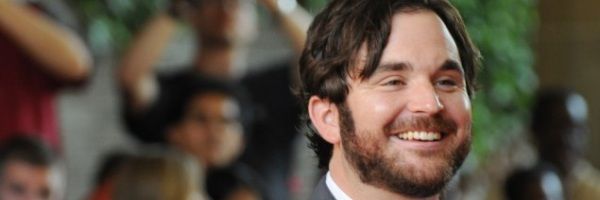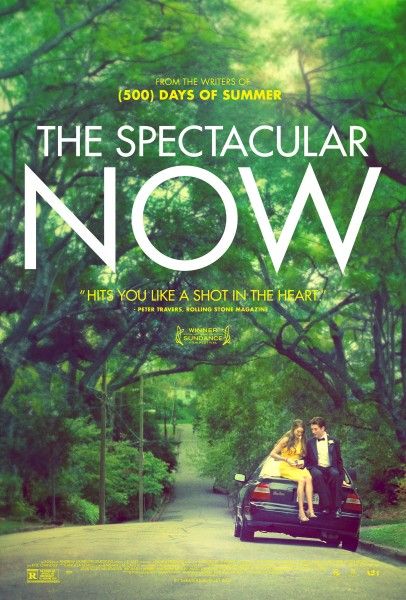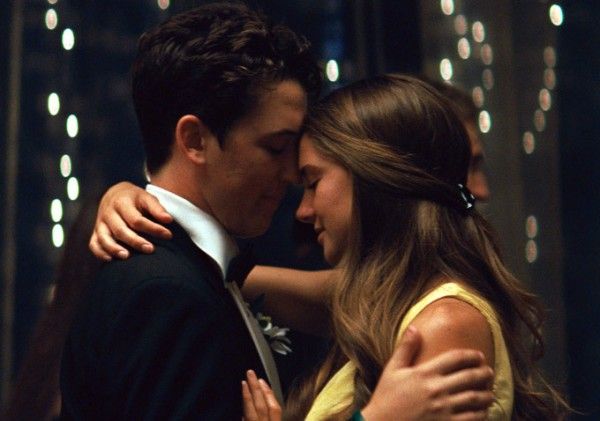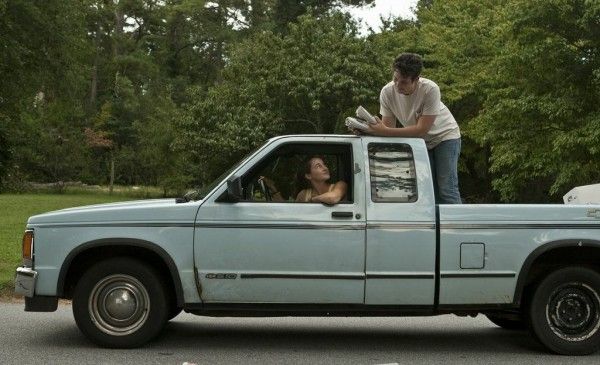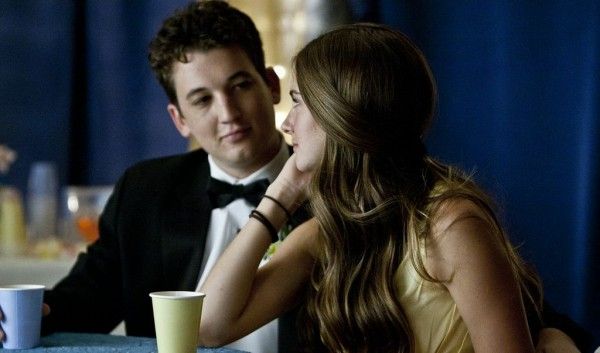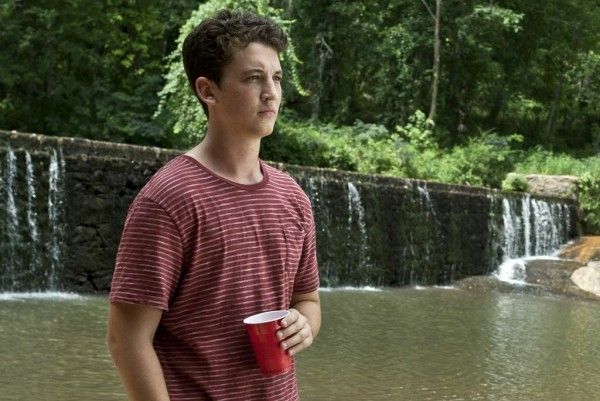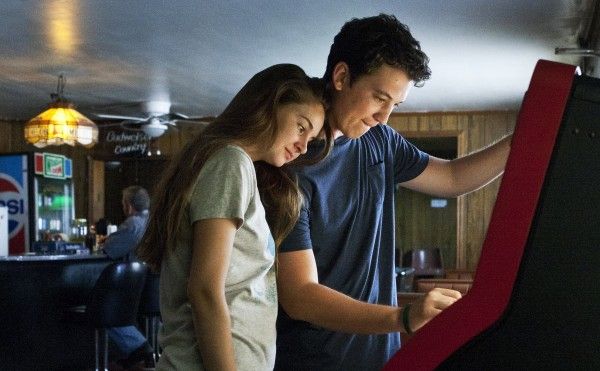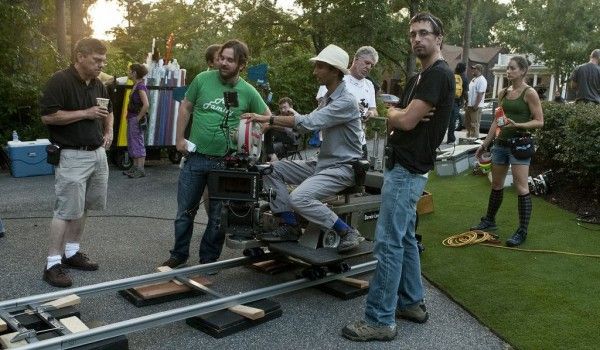One of the best movies I've seen this year is James Ponsoldt's The Spectacular Now. The coming-of-age film chronicles the unlikely relationship between directionless party boy Sutter (Miles Teller) and the quiet, reserved Aimee (Shailene Woodley). It's one of the few non-documentary films I've seen that honestly speaks to the teenage experience, and I encourage you to seek it out when it comes to your city (if it hasn't already).
Yesterday, I got the chance to sit down with Ponsoldt and talk about the movie. During out conversation, we talked about the film's journey from Sundance to distribution, the casting process, working with his talented crew, going for nostalgia over sentimentality, his upcoming movies Pippin and Rodham, and much more. Hit the jump to read the interview. Click here to find out when where The Spectacular Now will be playing near you.
This movie got picked up for distribution at Sundance, and I was wondering if you could walk people through the acquisition, the film festival circuit, and now it's in general release?
JAMES PONSOLDT: You mean like the entire thing?
Right, what is it like to be an indie filmmaker, and you premiere at Sundance, and it opens huge? I was at the premiere screening and the response was fantastic.
PONSOLDT: It was amazing! By the time you arrive at Sundance as a filmmaker, you've been living with your film intimiately, and scrutinized every frame, and probably aren't happy with—or at least I'm never happy with it—and you've seen it in the roughest of states, and you lose perspective, really. We had obviously done rough cut screenings along the way for family and friends, and we were proud of where it was at, but it feels like opening a restaurant, I guess? Like restaurants have soft openings and it's like "Is this restaurant ready to have customers or not?" and you never really know.
But you certainly don't have perspective. And there's so much pressure going into that opening night because you know there's journalists, tons of acquisitions people, and the fate of your film in some ways, if not decided, is really affected by how it screens that night. And that first screening was overwhelming. You were there. People applauded when the title card comes in; there's a big "gasp moment" partway through the film. It couldn't have gone better, and it was very surreal. And I was constantly trying to stay in body, so to speak. It feels very surreal, and I go away to a happy place where I'm there but not really there. I was just trying to enjoy the night, I guess is what I'm saying. We had a lovely after-party.
But it's crazy. The movie ends, and this is the way it is in 2013: a room full of blue lights come on, everyone's on they're iPhones, they're all tweeting, you have no idea what they're saying. It could be elite journalists from the Village Voice or the New York Times, or it could be a 13-year-old girl from Provo, Utah tweeting. But it's all very democratic, and there's something really exciting and empowering about that. And they could be tweeting anything from "Amazing movie!" to "What a waste of time!" And that's what people will read. There's that weird feeling during a Q&A because you wonder what they're saying.
It went really well, and we had meetings with acquisitions people all weekend, and I was really blown away by the A24 folks. They're a new company, but they were doing Spring Breakers and Bling Ring, and it meant a lot to me that Harmony Korine and Sofia Coppola would trust them. I knew a number of the people there from other companies like Oscilloscope and Big Beach; they were all really great people. And their vision for the film, like for how they wanted to take it out into the world, what they thought was unique about it and how to separate it from other movies out there especially movies about teenagers. It was really a pie-in-the-sky situation where they were saying what I hoped they would say. It was a meeting of minds that you don't always feel. There was a real sense they were taking a leap on us because they were a new company so our success and their success were bound together. I liked that because it wasn't one of those things where a huge distributor buys everything just to take it off the market, throwing a lot of spaghetti at the wall to see what sticks.
After that really, I spent the majority of the spring going to tons and tons of regional festivals throughout America. Every corner of the country, I took the movie to twenty film festivals or something to that extent. I've lost track. Probably done Q&As 40-50 times at this point. It's always hard to watch something I've made, but I've got a little more objectivity and kind of see the film as not just an extension of myself. I've heard a lot of variation of similar questions, but it's interesting to see the variations of audiences and how different people respond, so I think it's all valid. I don't take it personally at this point, which I probably would have at Sundance. But it's really thrilling.
Then obviously we opened in New York and L.A. this past Friday, and a couple days ago I was doing Q&As in L.A. all weekend, and the film did really, really well, and we were all thrilled. Again, we were really nervous. We knew the reviews were pretty darn positive, and they continued to come in up to Friday, and I was like "Wow. This critic really likes the movie, and so does this one." But again, nerve-wracking because the movie had to perform well and have good per-screen average for it to really platform in our best case scenario the way we wanted it to, and it did so we'll see. So we're now at the Tuesday after that, and our fingers are crossed for the next few weeks.
Shailene Woodley and Miles Teller are so good in this movie. What was the casting process?
PONSOLDT Shailene I had seen in The Descendants play George Clooney's daughter, and thought she was amazing. She was the real revelation of that movie. I knew every other actor in it, but I remember seeing this movie, and my first impression was, "This kid's a brat! This kid's kind of obnoxious, and I hope I don't have to spend two hours with her." That was my first thought! But by the end of the film, I realized, "Oh, this is a character who's in pain, and this is a transformative, really moving, mature performance." And I think what I reacted to negatively is that I saw myself in her, or saw myself at that age. And she just reminded me of a young Debra Winger, Sissy Spacek, Barbara Hersey—fiercely intelligent, no vanity whatsoever, really emotionally complicated performance. I couldn't remember seeing a performance from any other young actor that moved me so much.
Then I saw Miles Teller in Rabbit Hole acting opposite Nicole Kidman, and he blew me away. It felt like this is a Nicole Kidman movie about recovery and grief, and then this random kid from the suburbs wandered into a Nicole Kidman movie. It's like he wasn't doing kid-actor stuff; he wasn't doing a showy, histrionic performance. It was an internal, still performance, and what struck me most about his performance in that movie is that it's the way I was when I was sixteen, seventeen. Never in a million years would I want my friends to see me crying. I would have never wanted them to see that, they would have made fun of me so bad, and that's what that kid felt like. And then I saw him in the Footloose remake, and he was totally goofy, absurd, and so different. I didn't know of him, so I was like, "Who is this kid?" so I wound up meeting with him and Shailene both, and talking for hours. I have a very close relationship with the actors I work with. We trust each other, it's very collaborative. It's not sort of, "I'm the director, say what I want." I spend a long time finding the people that I want, and I cast them for their imaginations. I believe that they're honest, and surprise me, and can't really make wrong choices. It's about being on the same page about the character and what they want.
So I knew they were the right people. The film had a life before. It was initially going to be something Marc Webb was going to do as a follow-up to (500) Days of Summer, then he went off to do Spider-Man, so over the years pretty much every British, American, and Australian actor had auditioned at some point. It's pretty crazy. There's a vast video library of pretty much anyone you can imagine auditioning for Amy or Sutter. So I've seen them, but I knew Shailene and Miles were the people, and we certainly had great casting directors—Barbara McCarthy and Angela Demo—we definitely had auditions and read people for other parts. I definitely trust my gut. If I've seen someone give a performance that's moved me, and I already know what they're capable of, and I sit down and meet with them and think that their take on a performance is one that inspires me and captures my imagination, I don't necessarily need to run them through the process of running through hoops. I trust my gut.
One of the great things about this film is how authentic it feels to the teenage experience where a lot of films feel false. Even though you didn't write the screenplay, what personal experiences did you draw from to help craft that authentic feeling?
PONSOLDT: My apprehension about doing it in the first place was that it was something I hadn't written. But I read it because I respected [screenwriters Scott Neustadter and Michael H. Weber] and especially Tim Tharp's novel, which had been nominated for a National Book Award. When I read it, what blew me away was that I had been planning to write something about adolescence that vaguely dealt with the things I'd dealt with, but whenever I tried to write it, it felt waaay too autobiographical. I didn't have the distance yet to crack it to where it didn't just feel like a memoir. When I read this script, it was A) the most honest depiction of adolescence I've ever read, and B) it was my experience. Much of what Sutter's going through, I went through. I was a wildly self-destructive kid, and got in trouble a lot. And wound up meeting a girl who wasn't interested in the standard high-school party B.S. She loved reading, loved studying, loved working, loved talking about the future, didn't care if it was uncool. She couldn't care less. And I'd never met someone who was so sure of herself in that way. I just cared what other people thought too much because I wanted people to like me.
So the story was hyper-personal. I took it to Athens, Georgia even though the book takes place in Oklahoma, and the script took place in a non-specific place. I shot it in the streets and houses where I grew up. Cast the actors that I wanted, shot it the way I wanted in anamorphic-35, used the music I wanted, dressed and put the kids in clothes that felt really honest to what a public school in the South would be like and I think a lot of Middle America, didn't put the kids in make-up, and just tried to make the kids feel real. I gave real advocacy to the actors playing these parts. I was very forthright. I was like, "Hey, Shailene! You know much more about what it's like to be an 18-year-old girl as a 20-year-old girl than I do as a 34-year-old dude, so let's talk. What do you find honest? What do you find dishonest? Don't worry, you're never going to have to say this, so what would you say? Let's make this the sum of the parts of all the people." And that's the great thing about making a movie: it's a collaboration. If you don't like collaborating, go collect stamps or paint ducks. If you like working with other people and surrounding yourself with other people who are more talented and smarter than you, then film's a good thing if you can keep your ego in check.
From a casting side, it's sometimes harder to find people who are available than those on the technical side. Is there anyone on that side you'd like to keep working with?
PONSOLDT: I would work with any of them. They're all so good. I'm such a big fan when I watch so much TV and films that they're so many composers and editors and production designers and DPs that I want to work with because life is short. So when I see something beautiful I want to work with them. But yeah, the editor of our film, Darrin Navarro, is amazing. He edited William Friedkin's movies. He cut Killer Joe and Bug and he works with a great director, Azazel Jacobs; he cut Terri and Momma's Man for him. Darrin is a genius. Linda Sena is our production designer. She designed our last movie, Smashed. Jess Hall, who was the cinematographer on it, he shot a couple movies I really love like Son of Rambow and Hot Fuzz, which is a brilliant movie, and then he went off and just finished shooting the new movie from Wally Pfister, Christopher Nolan's cinematographer. He's an amazing collaborator, and Jess' father is from Jamaica. Like he brought all of these different experiences while Athens was hyper-personal for me, he had a real objectivity to it. Spaces that had a lot of emotional and sentimental value for me, if it didn't look right or if the quality of light wasn't right, we were able to have great conversations. The composer, Rob Simonsen, is sooo good. This summer he has The Way, Way Back, and he worked with Mychael Danna for years. So stuff people really like from Moneyball and Life of Pi he worked on. I could go down the list. They're all great. I would with any of them again in a heartbeat.
Recently, you've signed on to Pippin and Rodham. What is that transition to films that will get more scrutiny from the pre-production side as opposed to a film like The Spectacular Now, which could start out flying under the radar for people who hadn't seen Smashed? How do you work under a microscope?
PONSOLDT: You just work really hard and scrutinize. What is it called in politics? "Opposition research"? You want to do the detective work on your client so to speak before your opponent can dig it up. We're vetting everything thoroughly. With Rodham, for instance, it has to work on an emotional level. It has to work on a character level. If it's only "Look, it has famous people," then it's a wax museum come to life and that's really boring. It's sort of like what they say about science fiction and horror where the really good ones, if you remove that element of it, it still has to work. That's the reason The Shining works or Rosemary's Baby or Blade Runner. Blade Runner's just a noir at the end of the day. Rosemary's Baby is about the fear of having a child and how that gets in the way of a romantic relationship. Or whatever it is, and you add that extra element that blows your mind apart.
This needs to work on that level, but it has the additional strain of it's going to be profoundly scrutinized by political junkies from the right and the left who will pick apart every little thing. We are inherently dramatizing Hillary Rodham, or Hillary Clinton, who's a very famous figure. There's a lot of biographies about her, but there's also elements that are private moments, that are dramatized with an arc, and we have to take creative license. Everything is sort of a cost-benefit. "Is this worth it? Is this something that could be scrutinized?" Because there's not a political agenda with the movie. It's not trying to get her elected president, it's not trying to be a hit job. It's actually a complicated portrait of a young woman in her mid-20s choosing between love and career. And in that way, it should really relate to everyone. My sister, who is a social worker in Atlanta, and is not yet married but who has a boyfriend, should see it—obviously, she's biased, she knows me—but she should see it and see something of herself in the character. In the same way as in Smashed, yeah, she's an alcoholic, but we don't want to objectify her. We want to humanize her and created identification where people can relate to it. It's about a couple who have a profound common interest, and the destabilizing effects when something needs to change. And in that way, it was meant to relate to people who were in serious relationships where maybe your partner needs to go to grad school or get a job in another city. It's about fidelity and sacrifice. So I always try to find what's human and universal through the specifics.
And don't rush to make movies. Movies should be made when they're absolutely ready. There's too many bad movies being made.
You're attached to several projects, and I'm always fascinated by how people work when they take on so much. Right now, you're here doing interviews, doing an audience Q&A later for a movie that's still opening. What's your method of organizing your day when you have so much going on?
PONSOLDT: It depends. Obviously, this isn't my normal life, traveling to cities and talking to journalists. It's fun. It's really fun. I get to stay in a cool hotel and eat good food and meet cool people, but that's not my normal life. It's pretty pedestrian. I have coffee in the morning, I go for a run, and then I write for as long as I possibly can. In the case of this, I need to figure out what I have to do on a given day, what's due in the next two days, what's due in the next week, what's due in the next month, what's due in the next three months. I sometimes have to think about that because if I think about these five things and think of them all, I'll drop the balls, so I really have to prioritize and use every free second I have and maximize it. I wake up early, try to get sleep, but try to write for at least three hours every day. A really nice day for me is writing ten hours. I love that. Hasn't been a lot of that recently, but every free second I have I'm doing that.
But I also have really great collaborators. Like with Rodham, I didn't write that. Young Il Kim did, and he wrote a beautiful script. So I'm reading and giving him notes, and reading it on a plane, I'll write notes, and give them to him tomorrow, so things like that. On Pippin, I'm writing all the time, or adapting all the time.
What's it like working with a musical because on screen they can be really fun, and I don't want to say "more accessible", but I like musical movies in a different way than I like stage musicals.
PONSOLDT: Yeah, I would say that with the tone, what's really great about Pippin, is that it was written by Stephen Schwartz, who did Wicked, Bob Fosse directed the original. But it's not like dark Bob Fosses. It's not like All that Jazz or Chicago. The tone is like The Princess Bride or Monty Python and the Holy Grail. It's an absurdist, episodic take that's irreverent. At it's core, it's a coming-of-age story about a guy who's 22 and wants to live an extraordinary life, but can't even figure out what that means and how to make himself happy.
In many ways, I think I'm a good person for it. I mean, I'm not a musical theater dude. Or rather, I don't watch everything, and love everything, and have every album. The ones that I love—like I've seen The Wizard of Oz a hundred times. West Side Story I love. I love Singing in the Rain, I love White Christmas. I love the Dennis Potter ones like Singing Detective and Pennies from Heaven. I love Sondheim. I think now more than ever there's so much available honesty that you can find on the Internet. You can go on to YouTube and find really, really vulnerable, really verité stuff. It's not even verité, it's real! It's people confessing very private things. In a world with "It Gets Better" videos where people are trying to keep themselves alive and speak out to other people and are really brave and courageous. All the more a cheesy musical seems fake, so it requires a level of honesty to be injected or an acknowledgement of that which is fake and fun about musicals, and it isn't necessarily escapist. Like there are great musicals like Once, which feel very almost like a mumblecore musical. I love Once. It's great. What I think is great about Pippin, specifically, and I wouldn't make this generalization about all musicals, is that it is about how we tell stories and the way stories are very subjective. How we tell some things and leave other things out in the way The Princess Bride is or The Wizard of Oz is, which both have a framing device.
One of the things that I love with what you're talking about here is that there is a pull between honesty and connecting, and I think in a society that's become a little too dependent on ironic detachment; one of the things I really like about The Spectacular Now is that it is willing to put itself out there. So when you're writing, how do you be emotional and not sappy?
PONSOLDT: Something I thought a lot about with Spectacular Now was the difference between—and this is totally debatable by the way, and I'm sure even on Merriam-Webster you can go on there and say, "James Ponsoldt, you're wrong with what you're saying—but what I've come to believe is that the distance between nostalgia and sentimentality is a grey area. Sentimentality can be the death of good storytelling. It's where you put everything in a golden, dewy hew, and it's just, "Oh! Everything is so great! It's the best!" and you bowdlerize it, you castrate it, you neuter something that's real. Removing complications and contradictions—and people are inherently contradictory—for the sake of a "fun, great story." I think sentimentality makes movies age really quickly, and not age well.
Nostalgia, for me, I think there's something really great and sad in nostalgia. When I look at a movie like Last Picture Show or 400 Blows or some of Kieslowski's movies or like Tree of Life, those are nostalgic. Or Dazed and Confused. It's a look back at a time in someone's life that no longer exists. It's saying, "Yeah, at 18 I thought it was the greatest time on Earth." There's something inherently sad in that because the moment you say, "This is the best time," is gone. It's done. It will never happen again. Also, you recognize or don't recognize that being 17 or 18 was a profoundly traumatic time. It can be horrifying. Your body is in a hormonal rebellion against you, you have no control over anything, you're living under your parents' roof, you don't know what the future is going to hold. It's a totally anxiety-inducing time. But there are great things too. I think that movies that live in that space and acknowledge that everybody has a complicated, emotional inner life whether they're six or sixteen or sixty, and respects them, I think that's the common thread of the films I love. They respect the characters. They respect the intelligence of the audience. It seems easy, but so many movies don't do that. Audiences are very sophisticated of any age. 14-year-old audiences, who might sneak into The Spectacular Now because it's an R-rated movie, they're really sophisticated. They've seen themselves depicted so many times in TV and films, most of the time really badly or they transform into werewolves or something. There's no need to dumb it down. Just respect them.

